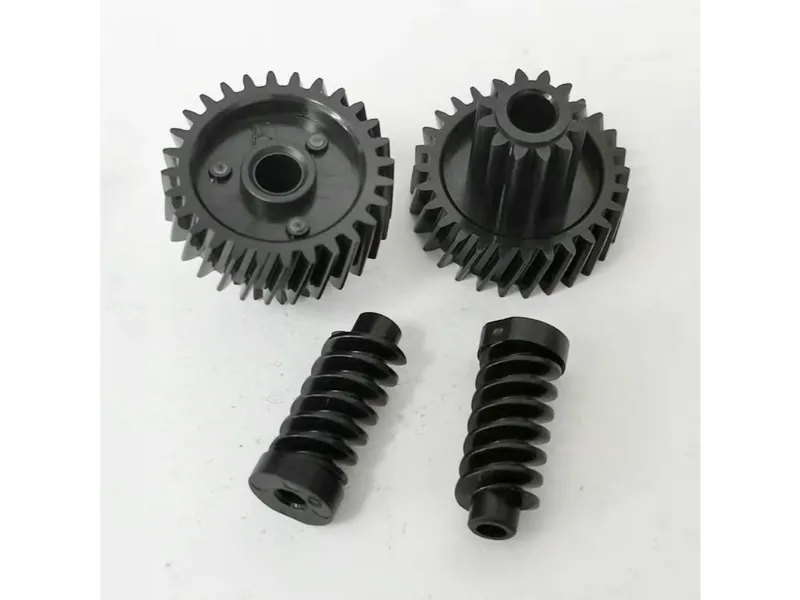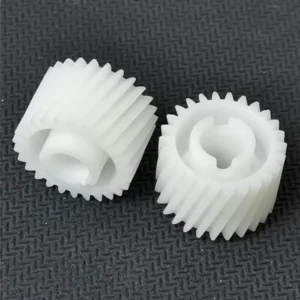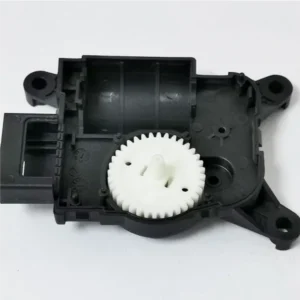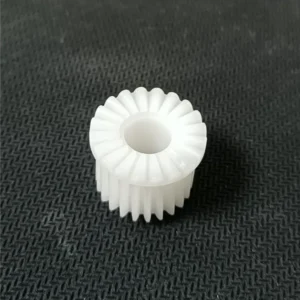Plastic Worm Gear:An Overview
What is a Plastic Worm Gear?
A plastic worm gear and shaft is a mechanical component used to transmit motion and power between non-parallel shafts, typically at a right angle. The worm gear, with its helical thread, engages with the worm wheel, producing smooth and quiet operation. These components are widely used in various applications due to their ability to handle high reduction ratios and operate with minimal noise.
What Materials Are Used for Plastic Worm Gears and Shafts?
Plastic worm gears and shafts are made from a variety of materials, each offering unique characteristics:
Acetal (POM): Known for its low friction, high stiffness, and excellent dimensional stability, making it suitable for precision gears.
Nylon (PA): Offers good wear resistance, toughness, and noise reduction, ideal for applications requiring durability and quiet operation.
Polycarbonate (PC): Provides high impact resistance and clarity, often used in transparent gear applications.
Polyethylene (PE): Features good chemical resistance and low cost, suitable for less demanding applications.
PTFE (Teflon): Extremely low friction and excellent temperature resistance, used in high-performance applications.
What Types of Gears Are Available in Plastic Worm Gear Sets?
Plastic worm gear sets can include various gear types:
Single-Throated Worm Gears: Standard design with a single helical thread on the worm, engaging with a worm wheel.
Double-Throated Worm Gears: Features a concave worm wheel that increases contact area, enhancing load capacity.
Non-Throated Worm Gears: Simplified design with straight teeth on the worm wheel, used in less demanding applications.
What Are the Gear Classes for Plastic Worm Gears?
Plastic worm gears are classified based on precision and performance:
Class 1: Basic quality, suitable for low-speed, low-torque applications.
Class 2: Improved precision and performance, used in general-purpose applications.
Class 3: High precision and performance, ideal for demanding applications requiring minimal backlash and high efficiency.
What Are the Tool Costs for Plastic Worm Gear Manufacturing?
Tooling costs for plastic worm gear manufacturing depend on various factors:
Mold Design: Complex molds for intricate gear designs can increase initial tooling costs.
Material Choice: Different materials may require specific tooling adjustments, impacting costs.
Production Volume: Higher production volumes can offset initial tooling expenses, reducing the cost per part.
What Are the Benefits of Plastic Worm Gears and Shafts?
Plastic worm gears and shafts offer numerous advantages:
Lightweight: Plastics are significantly lighter than metals, reducing overall component weight.
Low Noise: Plastic gears operate quietly, making them ideal for noise-sensitive applications.
Corrosion Resistance: Unlike metals, plastics do not corrode, offering longer life in harsh environments.
Cost-Effective: Generally cheaper to produce than metal gears, especially in high volumes.
Self-Lubricating: Many plastic materials have low friction coefficients, reducing the need for external lubrication.
What Are the Applications of Plastic Worm Gears and Shafts?
Plastic worm gears and shafts are used in various industries, including:
Automotive: Window regulators, seat adjustments, and mirror actuators.
Consumer Electronics: Printers, scanners, and copiers.
Medical Devices: Diagnostic equipment and small mechanical assemblies.
Home Appliances: Dishwashers, washing machines, and garage door openers.
Robotics: Actuators and drive systems for precise movements.
What Tips Should Be Followed When Using Plastic Worm Gears?
When using plastic worm gears, consider the following tips:
Avoid Excessive Loads: Ensure the gear design can handle the intended load to prevent deformation.
Consider Thermal Expansion: Account for plastic’s thermal expansion properties in the design phase.
Proper Lubrication: Use compatible lubricants if additional lubrication is necessary.
Regular Inspection: Periodically check for wear and tear to maintain optimal performance.
What Are the Standard Specifications for Plastic Worm Gears?
Standard specifications for plastic worm gears include:
Module: The unit of measure for the gear teeth size, typically ranging from 0.5 to 5.
Number of Teeth: Determines the gear’s size and reduction ratio.
Pressure Angle: Commonly 20°, impacting gear strength and smoothness.
Pitch Diameter: Diameter of the pitch circle, influencing the gear’s overall size.
What Famous Brands Are Replaced by Plastic Worm Gears?
Plastic worm gears can replace gears from well-known brands such as:
Boston Gear: Known for high-quality industrial gears.
Martin Sprocket & Gear: Provides a wide range of power transmission products.
Gears and Gearboxes: Specializes in precision gear solutions.
What Are the Product Types in Plastic Worm Gear Sets?
Plastic worm gear sets come in various types:
-
Standard Worm Gear Sets: Off-the-shelf solutions for general applications.
-
Custom Worm Gear Sets: Tailored to specific design requirements and applications.
-
Reducer Worm Gears: Used in gear reducers for high-torque, low-speed applications.
What Should Be Considered When Choosing Plastic Worm Gears?
Consider the following when choosing plastic worm gears:
Load Requirements: Ensure the gear material and design can handle the required load.
Environmental Conditions: Consider temperature, humidity, and chemical exposure.
Longevity: Choose materials and designs that offer the required lifespan for the application.
Compatibility: Ensure the gear set fits seamlessly into the existing mechanical system.
What Custom Services Does Welleshaft Offer for Plastic Worm Gears?
Welleshaft provides a range of custom services, including:
Design Assistance: Expert guidance to optimize gear design for specific applications.
Material Selection: Recommendations on the best plastic materials for your needs.
Prototype Development: Rapid prototyping to validate designs before mass production.
Precision Machining: High-precision machining for tight tolerances and intricate designs.
Quality Assurance: Rigorous testing and inspection to ensure top-notch quality.
Why Choose Welleshaft for Your Plastic Worm Gear Needs?
Choosing Welleshaft offers several benefits:
Expertise: Decades of experience in plastic gear manufacturing.
Quality: Commitment to high-quality standards and precision.
Customization: Ability to create bespoke solutions tailored to your requirements.
Technology: Utilization of advanced manufacturing techniques and equipment.
Customer Support: Dedicated service and support throughout the entire process, from design to delivery.
By understanding the intricacies and advantages of plastic worm gears and shafts, you can make informed decisions for your applications, ensuring the best quality and performance for your products.





Reviews
There are no reviews yet.